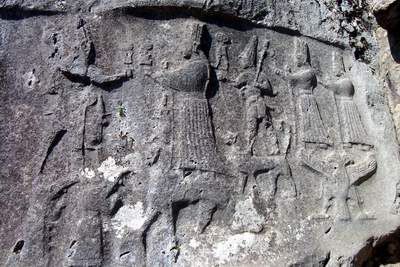


Notice: This is the official website of the All Empires History Community (Reg. 10 Feb 2002)
Sea Peoples |
Post Reply 
|
Page <123 |
| Author | ||
Maju 
King 

Joined: 14-Jul-2005 Online Status: Offline Posts: 6565 |
 Quote Quote  Reply Reply
 Topic: Sea Peoples Topic: Sea PeoplesPosted: 24-Jul-2005 at 12:43 |
|
Fine but one thing doesn't exclude the other. Most likely Sea Peoples were Greeks (+ ???) but that can't deny the Urnfield culture expansion in other well documented areas, even if they had no relationship at all with Sea Peoples and/or Dorians. Anyhow... can anyone shed light on who were the Phrygians (who obviously were the one that benefitted from Hittite destruction) and Thracians (who were around since more or less that time)? |
||
 |
||
Zagros 
Emperor 
Suspended Joined: 11-Aug-2004 Online Status: Offline Posts: 8792 |
 Quote Quote  Reply Reply
 Posted: 24-Jul-2005 at 14:51 Posted: 24-Jul-2005 at 14:51 |
|
|
1. I don't rule anything out. 2. You know they could just have been indigenous tribes that became dominant with the fall of their predecessors, not everything should be explained with an invasion theory.
|
||
 |
||
Maju 
King 

Joined: 14-Jul-2005 Online Status: Offline Posts: 6565 |
 Quote Quote  Reply Reply
 Posted: 24-Jul-2005 at 16:01 Posted: 24-Jul-2005 at 16:01 |
|
|
Most of the time invasions (that don't usually mean genocide but
subjugation and aculturization) are the answer. When the locals are
still separated from former invaders, they show cultural differences
that are reflected in archaeological findings that would allow us to
trace such reversal of the situation.
It doesn't seem to be the case of the Phrygians, or at least what I've found on them: Wikipedia says on their language: It is believed that it was close to Thracian and maybe Armenian, mostly on grounds of classical sources. Herodotus recorded the Macedonian account that Phrygians emigrated into Asia Minor from Thrace (7.73). Later in the text (7.73), Herodotus states that the Armenians were colonists of the Phrygians, still considered the same ethnos in the time of Xerxes I. Judging from linguistics, Phrygian appears closest to Greek, a language with which it was for some time in contact. We know that pre-Hittite dwellers of the area (Hatti) were pre-IE (following the Hittite records that also include some Hatti language), so doesn't seem like Phrygians and Hatti are related (unless they are Hellenized Hatti - ???). What seems very curious is to find out that Armenians were Phrygians in origin. Something I didn't know at all. Other links: Phrygians.com. |
||
 |
||
Guests 
Guest 
|
 Quote Quote  Reply Reply
 Posted: 24-Jul-2005 at 17:39 Posted: 24-Jul-2005 at 17:39 |
|
|
Hatti belonged to the Caucasian group, not IE. hittite language was just assimilated by IE, they were originally Caucasian. |
||
 |
||
Maju 
King 

Joined: 14-Jul-2005 Online Status: Offline Posts: 6565 |
 Quote Quote  Reply Reply
 Posted: 24-Jul-2005 at 19:24 Posted: 24-Jul-2005 at 19:24 |
|
That's what I said: pre-IE. I have long assumed that pre-IEs of Anatolia and the Zagros were Caucasic speakers but I didn't want to go further in detail.  |
||
 |
||
Zagros 
Emperor 
Suspended Joined: 11-Aug-2004 Online Status: Offline Posts: 8792 |
 Quote Quote  Reply Reply
 Posted: 25-Jul-2005 at 09:14 Posted: 25-Jul-2005 at 09:14 |
|
|
Yes, Hurrians were pre IE inhabitants of the Zagros area, I believe Hurrians were Caucasian speakers; the Kurdish town of Awriman (Hurrian) still bears their name.
|
||
 |
||
tudhaliaIV 
Immortal Guard 

Joined: 18-Jul-2015 Online Status: Offline Posts: 4 |
 Quote Quote  Reply Reply
 Posted: 18-Jul-2015 at 07:50 Posted: 18-Jul-2015 at 07:50 |
|
|
"Democracy is the theory that collective wisdom derives from individual ignorance." -- H.L. Mencken
|
||
 |
||
tudhaliaIV 
Immortal Guard 

Joined: 18-Jul-2015 Online Status: Offline Posts: 4 |
 Quote Quote  Reply Reply
 Posted: 18-Jul-2015 at 07:52 Posted: 18-Jul-2015 at 07:52 |
|
|
Has the book "The Sea Peoples" by Sandars been discussed here?
|
||
 |
||
Centrix Vigilis 
Emperor 

Joined: 18-Aug-2006 Location: The Llano Online Status: Offline Posts: 7392 |
 Quote Quote  Reply Reply
 Posted: 18-Jul-2015 at 10:33 Posted: 18-Jul-2015 at 10:33 |
|
|
no but I have begun to reread an original contributor to the concept.
Gaston Maspero. |
||
|
"Absence of evidence is not evidence of absence"
S. T. Friedman Pilger's law: 'If it's been officially denied, then it's probably true' |
||
 |
||
CedricEmrys 
Janissary 
Joined: 12-Feb-2018 Location: Connecticut Online Status: Offline Posts: 26 |
 Quote Quote  Reply Reply
 Posted: 12-Feb-2018 at 08:37 Posted: 12-Feb-2018 at 08:37 |
|
|
I do believe they fought the Hittites, I’m not sure they won. They were slaves to the egyptians, and the egyptians later attacked a Israelite city but Israel’s King was killed in that battle.
|
||
|
Buaidh no bàs
|
||
 |
||
CedricEmrys 
Janissary 
Joined: 12-Feb-2018 Location: Connecticut Online Status: Offline Posts: 26 |
 Quote Quote  Reply Reply
 Posted: 12-Feb-2018 at 08:49 Posted: 12-Feb-2018 at 08:49 |
|
|
Some think the survivors of Atlanta’s, And there were survivors, were the Celts of Wales since the welsh Celts had a slightly different culture than the rest of the isles.
|
||
|
Buaidh no bàs
|
||
 |
||
rondak46 
Janissary 
Joined: 09-Apr-2014 Location: new york Online Status: Offline Posts: 23 |
 Quote Quote  Reply Reply
 Posted: 18-Feb-2018 at 16:28 Posted: 18-Feb-2018 at 16:28 |
|
A more accurate time frame has the Sea People's showing-up around 1200 B.C. |
||
 |
||
rondak46 
Janissary 
Joined: 09-Apr-2014 Location: new york Online Status: Offline Posts: 23 |
 Quote Quote  Reply Reply
 Posted: 18-Feb-2018 at 16:33 Posted: 18-Feb-2018 at 16:33 |
|
|
||
 |
||
rondak46 
Janissary 
Joined: 09-Apr-2014 Location: new york Online Status: Offline Posts: 23 |
 Quote Quote  Reply Reply
 Posted: 18-Feb-2018 at 17:31 Posted: 18-Feb-2018 at 17:31 |
|
|
Cedric, The timing of your revival of this thread is fortuitous. I have recently become interested in the Sea Peoples, as I often come across them in my ancillary studies. With regard to the Wikipedia entries I have searched, I found something quite curious. I converted the Wiki entries to PDFs, to make them more easily searchable, and this is what I noticed: In my 53 page PDF on the “Sea Peoples” there is no mention of Phoenecia. In my 54 page PDF on “Phoenicia”, there is no mention o “Sea Peoples” Yet, regarding the Sea Peoples, they are given a time-frame for their exploits of between 1200 and 900 B.C.; whilst the Phoenicians are credited for enjoying their prime between 1200 and 800 B.C.. How can the two cultures be treated properly in isolation; describing one with no mention made of the other? Are we not talking about the consolidation, in the Eastern Mediterranean, of a group, a culture, a way of life that had spread across the sea and become cosmopolitan to the Mediterranean? Are we not seeing, in the descriptions made by the Egyptians, Anatolia, Syrians and Hitites, the ascendency of an empire that had arose, under their noses, to dominate the full range of the Mediterranean, and were only now being noticed as the power player of the frontier between each of them and encroaching upon what they had understood to be their territory? The Wikipedia has a chart which uses various ancient words for the Sea Peoples and their origins. Indeed the the assertions therein span the Length and breadth of the Mediterranean, from Sardinia, Sicily, The Tyrrhenian Sea, Mycenae, Greece and Anatolia. Could it not be all of these places? Could it be that Phoenicia had come of age and simply began to dominate all who resisted, and indeed, reasserted hegemony over what is often, possibly falsely, considered their homeland. It has been argued that the word Phoenician is a construct of later times, referring to the empire that plied in the trade of purple dies and textiles, and that it is not a term that they would have called themselves. Are the Sea Peoples simply the Phoenicians, in ascendency? Regards, Michael Edited by rondak46 - 18-Feb-2018 at 17:34 |
||
 |
||
Arthur-Robin 
General 
Joined: 23-Feb-2006 Location: Australia Online Status: Offline Posts: 937 |
 Quote Quote  Reply Reply
 Posted: 20-Feb-2018 at 00:09 Posted: 20-Feb-2018 at 00:09 |
|
|
It is problematic using orthodox ascribed dates because they are out by some hundreds of years. For example evidences suggest that the 19th dynasty of Egypt is not "1300s/1200s" bc but is rather about the time of Shishak and Zerah in the bible (which is ca 1000s/900s). Its better to use dynasties etc. Sea Peoples were 19th & 20th dynasty.
Regarding Atlantis mentioned in several posts new evidences are very strong that Atlantis city is Tiahuanaco/Tiwanaku, with matches for all the details of the Atlantis Account without bending etc. Orthodox books admit they don't know where the Sea Peoples came from, and they mention evidence of links with Sardinia. Egyptian accounts of "(north) sea people(s)" [N-pa-iam / Haunebu(t) also used for "Greeks/Hellenes"] say they came "from the ends of the world/earth", "great darkness", "9th bow/arc", "the isles and mainland of the outer circle of water" / "the great water circle [sin-wur]", "from the pillars/pillar of heaven", and they had "a great fleet of sailed-ships with arching prows at each end, in the shape of bird-heads.... ... the sailed ships of the Peleset were overwhelmed by the slave-oared Egyptian river craft....", and that their "islands are uprooted and carried away .... The might of Nun (the Ocean) broke forth and fell in a great wave upon their towns and villages" (also that the head of their cities was submerged). ("Their forests and fields are burnt with fire." "The heat of him has burnt their countries." "The fire of Sekhmet has burnt the lands of the 9 bows/arcs." "As mighty fire was prepared before them." "They had before them a sea of flame.") Sea Peoples were 19th & 20th dyn. [American] c0caine and tobacco was found in 19th & 21st dyn mummies. Fitzgerald-Lee in 'Great Migration' said Assyrian pictures of Toakkari [or Tjekker] 'Sea Peoples' bearing South American fan palm. http://www.allempires.com/forum/forum_posts.asp?TID=36769 The Sea Peoples of 19th/20th dyn seemingly might be contemporary of Pelasgians of Thalassocracies just after the Trojan war? |
||
|
NZ's mandatory fluoridation is not fair because it only forces it on the disadvantaged/some and not on the advantaged/everyone.
|
||
 |
||
Post Reply 
|
Page <123 |
| Forum Jump | Forum Permissions  You cannot post new topics in this forum You cannot reply to topics in this forum You cannot delete your posts in this forum You cannot edit your posts in this forum You cannot create polls in this forum You cannot vote in polls in this forum |
Copyright ©2001-2009 Web Wiz
This page was generated in 0.109 seconds.











 Printable Version
Printable Version Google
Google Delicious
Delicious Digg
Digg StumbleUpon
StumbleUpon Windows Live
Windows Live Yahoo Bookmarks
Yahoo Bookmarks reddit
reddit Facebook
Facebook MySpace
MySpace Newsvine
Newsvine Furl
Furl Topic Options
Topic Options